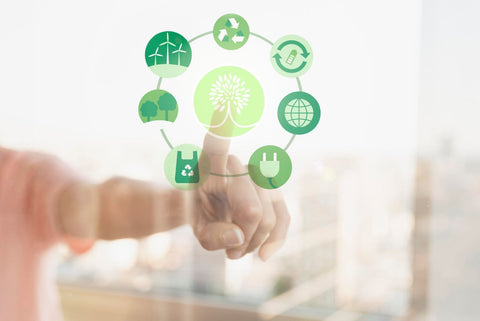In the first part of this series, we want to take a broad look at ECO LABEL certification. In this post, we will not only give you the general information, but also talk about the benefits, challenges and how CYCLE has achieved ECO LABEL certification.
The ECO LABEL is an environmental certificate awarded to products and services that meet the criteria they have set. Its aim is to encourage businesses and consumers alike to operate and live more sustainably.
ECO LABEL certified products must comply with a set of criteria that assess energy efficiency, water use, the use of environmentally friendly raw materials and the minimisation of emissions from an environmental perspective. But it's not just environmental aspects that are taken into account, social and economic factors such as support for the workforce and local communities are also taken into account.
ECO LABEL also has many benefits for consumers. It gives consumers the confidence to choose products that have a low environmental footprint and contribute to sustainability. ECO LABEL helps consumers make informed choices and support businesses that take a responsible approach to environmental issues.

Products carry this logo as ECO LABEL certification
ECO LABEL is also a guide for businesses to improve their products and manufacturing processes to keep up with sustainability trends.
Why is ECO LABEL's presence in the market important?
ECO LABEL's work plays a prominent role in promoting sustainable consumption and supporting environmental protection. This certification is not just a symbol, but a multi-faceted scheme that encourages positive change in society and businesses.
The primary importance of the ECO LABEL lies in its role of recognising and rewarding products that meet their high environmental criteria. It assesses how and to what extent manufacturers minimise their ecological footprint during production. Such products promote the uptake of environmentally friendly technologies, contributing to global sustainability efforts.
But recognising steps towards sustainable development not only encourages businesses, it also inspires consumers to make more informed choices. For consumers, the ECO LABEL can be a guide to conscious purchasing. It can help them identify and support products that take a responsible approach to the environment. In this way, consumers become active participants in sustainability actions, contributing to the spread of environmental awareness.
How does a product or service get ECO LABEL certification?
Obtaining ECO LABEL certification is not a simple process, but rather a thorough and rigorous set of steps. Manufacturers need to carry out a comprehensive analysis of the entire life cycle of their product and meet a number of criteria.
These include energy efficiency, sustainability of raw materials, minimisation of environmental impacts, including product packaging design and waste management strategies.

Companies must meet various criteria
Once a company has contacted the organisation, they will send them the application document, and after filling it in, they will analyse the data and comment on the points that need to be made. They will then carry out a monitoring visit to the company to assess the extent to which the manufacturer meets the criteria and the requirements.
The process is therefore not only an administrative obligation, but also a commitment that contributes to the spread of more sustainable practices.
What are the benefits of certification for consumers?
The ECO LABEL helps consumers to identify environmentally friendly products more easily. The logo on the label is a clear indication that the product has been certified. This means that consumers do not have to dig deep into the product information, but simply look for the ECO LABEL mark.
ECO LABEL guarantees that the product you buy meets the environmental standard they have developed, so consumers can confidently choose products that contribute to sustainability.
In addition, the certification provides an opportunity for consumers to actively promote environmentally friendly practices in the market. Those who choose ECO LABEL products are directly involved in creating a more sustainable and environmentally conscious future.
Criticisms and challenges
The ECO LABEL scheme, while a powerful tool for promoting sustainability, cannot escape challenges and criticisms. Some argue that obtaining certification can be too costly for businesses, especially small and medium-sized enterprises. This financial burden can make the transition to sustainability more difficult, especially for businesses that are already struggling with a fundamentally higher operating cost.
Another weakness of ECO LABEL is that it does not take into account the specificities of each industry sufficiently. Some sectors have different environmental constraints and challenges, so not all schemes can adapt to the criteria. As a result, some industries face challenges in obtaining ECO LABEL certification, which means that the final result may not always reflect the true environmental performance of the company.
We have shared our further thoughts pro and con in this previous article: https://hu.cycle.bio/blogs/blog/mi-lehet-az-idealis-zold-tanusitvany
CYCLE fights against painting green
As ECO LABEL plays a significant role in green certification, it is important to recognise that it may not fully meet all environmental requirements.
In a day and age where greenwashing is a growing concern, alternative certifications such as Green Brands or Leaping Bunny offer consumers options that can better match products to their unique values.
As the market for green cleaning products continues to grow, the issue of painting green cannot be ignored. And in the fight against greenwashing, informed consumers can be key players by demanding transparency and supporting products that reflect their environmental values.
While ECO LABEL remains a recognised certification, it may not fully meet the needs of all environmentally conscious consumers.
CYCLE, we have developed our own proprietary process to produce recycled organic acids and vinegar for our cleaning products.
We do all this using recycled water, minimising the waste of one of our precious resources - water. We also promote the use of less plastic, rejecting virgin plastic and prioritising recycled plastic and the reuse of our bottles.
Reducing CO2 emissions is also a top priority for us. We have managed to reduce the CO2 footprint of these products through the measures we take in the transportation and use of our concentrates.

Have a look around the webshop and discover our concentrates
This also includes our circular approach, which starts with the recycling of wastewater and ends with our cleaning products! Or rather, it doesn't stop, it keeps on turning. Our products are returned to the system when they are used in the home, and return to our manufacturing process as raw materials.
And last but not least, through our text and video content, we aim to educate our environment and our customers about the steps we take every day to live greener lives.
Outlook for the future
With a focus on sustainability, ECO LABEL certification can play a significant role in creating a more conscious relationship between businesses and consumers. We are confident that in the coming years the certification will become more widespread at global level and more widely accepted in the international market.
But the system will also face some challenges in the future. One is the increasing diversity of industries and businesses, and ECO LABEL will have to adapt to these changing needs and specificities .
The role of technology and innovation could also be critical in the coming decades. Like brands, certification schemes need to keep pace with new green developments to support businesses that are moving towards forward-thinking and sustainable solutions.
Despite the challenges, ECO LABEL remains a powerful tool for promoting environmental protection.
Overall, underlining the importance of the ECO LABEL certification, it can be said that this recognition is not just a label, but an active tool to promote sustainable development. And the promotion and recognition of the certificate creates opportunities not only for businesses, but also for consumers to make more conscious and environmentally aware choices. And ECO LABEL products are a collective effort towards a sustainable future.
Source : https://www.ecolabel.net/hu/




















